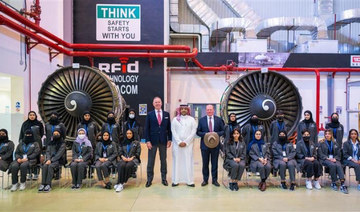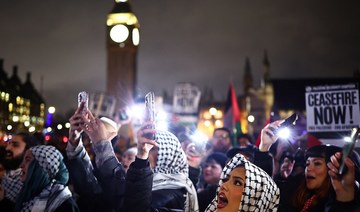ESSEN, Germany: Chancellor Angela Merkel Tuesday lashed populists seeking to exploit Germany’s refugee influx, but set down a tough line on integration — including a ban on the veil — as she launched into election campaign mode.
Outlining a strategy to counter populism that has consumed key allies abroad, Merkel vowed there would be no repeat of last year’s record refugee arrivals.
She also stressed it was legitimate for Germany to expect newcomers to integrate, and this included a rejection of the niqab full-face veil.
“The full veil must be banned wherever it is legally possible,” she told the annual gathering of her center-right Christian Democratic Union (CDU).
Next year’s polls will “not be a walk in the park” as Germany is deeply polarized, Merkel warned, but urged the population to remain “skeptical about simple answers.”
“Rarely is it the simple answers that bring progress to our country,” she said, in a clear reference to the upstart anti-Islam and populist AfD, which Merkel had previously criticized as offering no solutions to problems.
Merkel, who has led Germany for 11 years, last month confirmed she would run for a fourth term but acknowledged that the election would be “more difficult” than any other she has contested.
There have also been questions about whether the 62-year-old has fresh ideas to offer in a world upended by Brexit, the surprise election of Donald Trump and the departure of Italian Prime Minister Matteo Renzi following a crushing referendum defeat championed by populists.
The CDU has suffered setbacks in five consecutive state polls as voters punished Merkel for her liberal refugee policy, with more than a million people seeking asylum in Germany since 2015.
Tackling the hot button issue head-on, Merkel vowed that, “a situation like that of summer 2015 can and must not repeat itself.”
She also stressed that each asylum request would be examined carefully, and “not all can and will stay” in Germany.
Merkel’s CDU and its Bavarian sister party CSU secured a decisive win of 41.5 percent at the last election in 2013 — its best result since national reunification in 1990, on the back of strong approval for her tough stance on austerity for debt-stricken EU nations.
Three years on, there are rumblings of discontent — even within her own party — following her September 2015 decision to admit refugees fleeing war in mostly-Muslim nations, a move that deeply polarized Europe’s biggest economy.
Reflecting the mood, party faithful re-elected on Tuesday Merkel as chief for the next two years, but gave her just 89.5 percent — her second worst score, and the worst since she became chancellor in 2005. Her lowest was in 2004, when she was approved by 88.4 percent.
National media had suggested that a score below 90 percent would be a slap in the face.
Party members are particularly anxious to halt a haemorrhage of support to the AfD, which has gained a firm footing as a protest platform for disgruntled voters.
The upstart party now enjoys around 12 percent support, according to opinion polls. At the last general election it fell short of the five-percent threshold to ensure representation.
Hitting out directly at the populists as well as the xenophobic PEGIDA movement, Merkel wrestled their “we are the people” rallying cry back, declaring to sustained applause: “We all get to determine who ‘the people’ are — not just a few, no matter how loud they are.”
Beyond domestic issues, Merkel also devoted a large part of her address to crises abroad as she noted that in 2016, “the world has not become stronger and more stable, but weaker and more unstable.”
She deplored the failure of the international community to alleviate the suffering in Syria’s besieged city of Aleppo, calling it a “disgrace.”
Merkel said she was shocked to see tens of thousands of Germans hitting the streets to demonstrate against free trade deals but virtually no protests against the bloodletting in Syria.
“There is something wrong there,” she said.
She also underlined the importance of holding the European Union together, saying Germany will do well “only when Europe does well too.”
In the face of the mountain of challenges, Merkel urged her delegates: “You must, you must, help me.”
Merkel launches election bid with tough line on immigration
Merkel launches election bid with tough line on immigration
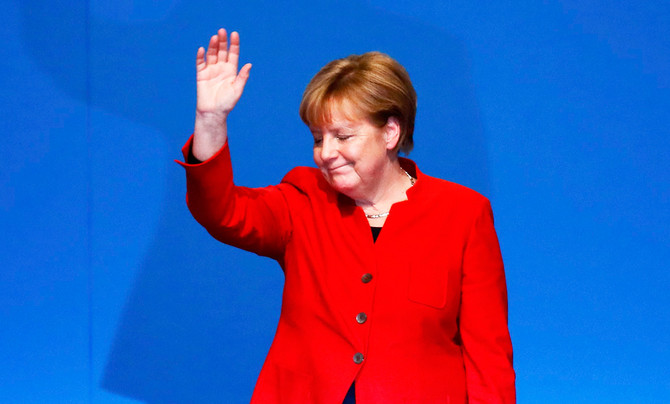
Pakistan’s deaf-staffed beauty salon provides economic opportunity, empowers hearing impaired
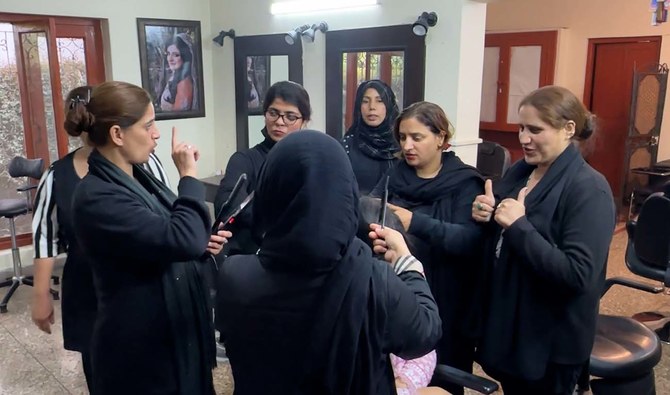
- There are seven deaf beauticians out of a total of 12 employed at Options Salon in Abbottabad
- According to the World Health Organization, deaf population in Pakistan is around 10 million people
ABBOTTABAD: Eight years ago, while offering a training class at her Options beauty salon in the northwestern Pakistani city of Abbottabad, Nighat Aftab received an unlikely application: that from a deaf girl who wanted to attend the training and join her salon.
“I didn’t have much experience working with such women and at first, I hesitated a little that how could I hire such a person whose language I don’t understand?” Aftab told Arab News in an interview earlier this month. “But then I said, ‘Come, join me’.”
Today, there are seven deaf beauticians out of a total of 12 employed at Options, which has since become a sanctuary for women with hearing and speech impairments, providing them economic opportunity, a chance to be financially independent and earn for their families, and a place where they can be part of a supportive, inclusive community.
According to the World Health Organization, the deaf population in Pakistan is around 10 million people. Pakistan has one of the lowest percentages of female labor force participation in South Asia and women with disabilities face even more impediments to employment.
“Previously, I used to work at a parlor in Islamabad where my salary wasn’t great, and I used to miss home a lot,” beautician Saima Mir told Arab News in sign language as Aftab translated for her.
“Now I am very happy. I like working here. There are many here who cannot hear and speak, it makes me happy.”
Others also said they felt a “sense of belonging” at the Options Salon.
“I have my mother and father. They are old. I feel frustrated at home as there is nobody with whom I can talk and share,” Isma Mushtaq told Arab News. “I come here and I spend time here happily.”
While many of the salon’s loyal customers are now used to communicating with the deaf staff members, that was not always the case, Aftab recalled, saying she faced criticism in the beginning by clients struggling to communicate with her workers. To bridge the gap, deaf workers were teamed up with those from the hearing community.
“The difficulties we faced [with communication] in the beginning got resolved over time,” said Sobia Khan, a beautician from the hearing community.
And the troubles had been worth it, Aftab said.
“I might have closed down the salon by now because my daughters are now married and I want to enjoy my own life but I am committed because of these young women [deaf workers] and I am unable to quit because their employment is attached to me,” she said.
“And because of them, Allah has blessed me with health. I am able to come to work daily, even though I am not that healthy, but I am happy here.”
Riyadh Air to expand fleet with additional aircraft orders, CEO reveals

RIYADH: Saudi Arabia’s Riyadh Air plans to bolster its aircraft lineup through additional orders, as it requires “a very large fleet” to establish itself alongside regional giants, stated the CEO.
This move comes as the Kingdom’s second flag carrier, backed by the country’s Public Investment Fund, ordered 39 Boeing 787-9 jets last year, with options for 33 more.
It also aligns well with Saudi Arabia’s goal to expand its aviation industry and attract more tourists, broadening its airline capacity beyond pilgrimage travel, which currently forms the backbone of the country’s inbound tourism.
“We need a very large fleet, we’re going to make a number of additional orders,” CEO of Riyadh Air, Tony Douglas, said in an interview with Bloomberg Television.
He added: “We will be making a narrowbody order, we’ll probably be doing another large order after that to build us up to scale.”
During the interview, Douglas, who previously led the Abu Dhabi flag carrier Etihad Airways, expressed being “very conscious” of potential delays to aircraft deliveries. This concern arises as both Boeing and Airbus SE grapple with production challenges amidst record demand and supply issues at the two plane makers.
The establishment of a second Saudi national airline alongside the existing flag carrier Saudia is part of the Kingdom’s economic diversification plan.
In November 2023, Douglas expressed confidence in the demand for travel. “We’re not well enough connected. It’s as simple as that,” he said at the time.
The new airline stands to benefit from Saudi Arabia’s rapidly growing economy and the increasing influx of tourists to the Kingdom. Riyadh Air does not intend to pursue mergers and acquisitions to fuel its growth. “No, it’s organic,” Douglas emphasized at the time.
The initial destinations will include major cities in Europe, the US East Coast, and Canada, with the inaugural flight scheduled to depart by June 2025.
By that time, Riyadh Air will have secured slots at major airports, Douglas mentioned, although hubs like London Heathrow are already operating close to capacity.
“It won’t be easy ... but we have no reason to be anything other than confident that we’ll resolve all of that,” he said at the time.
Pro-Palestine Oxbridge students set up encampments

- They are demanding transparency about the universities’ financial links to Israel
- ‘We will not move until our demands are met’
LONDON: Students at the universities of Oxford and Cambridge have set up encampments in support of Palestine, The Times reported on Monday.
Around 50 have refused to leave the lawn of King’s College, Cambridge, while students have also declared a “liberated zone” outside Oxford’s Pitt Rivers Museum.
A banner hung outside King’s College read: “Welcome to the people’s university for Palestine.” Chants of “stop the bombing now” have also been heard on the campus.
The protests have been organized by Oxford Action for Palestine and Cambridge for Palestine.
They are demanding transparency about the universities’ financial links to Israel, which they have described as a “settler colonial state,” and are calling for the end of all investments and endowments from Israeli and Israel-linked companies.
“We have set up camp in university grounds, and we will not move until our demands are met,” the groups said in a statement, adding that the universities are legitimate targets for protests because of their “role in the British empire and its disastrous colonial legacies.”
The Times reported that protesters had been given an itinerary for their involvement including “de-escalation training” and “banner-making.”
A spokesperson for Cambridge University said it is for the college to decide whether to call the police, adding: “The university is fully committed to academic freedom and freedom of speech within the law and we acknowledge the right to protest.
“We ask everyone in our community to treat each other with understanding and empathy. Our priority is the safety of all staff and students.
“We will not tolerate antisemitism, Islamophobia and any other form of racial or religious hatred, or other unlawful activity.”
The relatively small UK protests come after nearly 2,000 people were arrested across the US after widespread demonstrations on over 130 American university campuses about Israel’s ongoing war in Gaza.
Iran, Pakistan seek ways to complete gas pipeline project
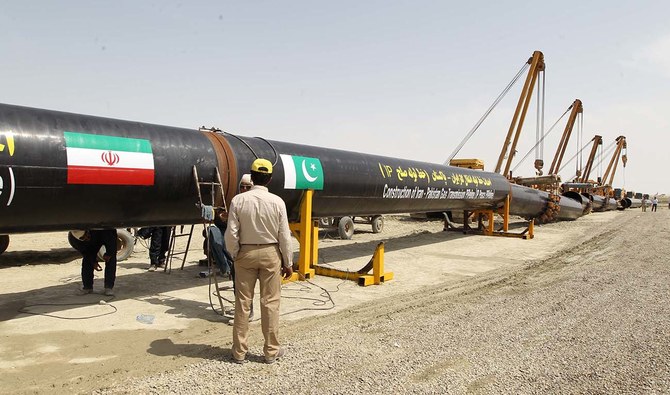
- Both countries signed agreement to construct the pipeline from Iran’s South Fars gas field to Pakistan’s Balochistan, Sindh
- Tehran says has invested $2 bln to construct pipeline, but work on Pakistan side has been held up due to fears of US sanctions
KARACHI: Iran and Pakistan are looking at ways to complete a long-delayed gas pipeline project between the two countries, Iran’s Consul General to Pakistan, Hassan Nourian, said on Monday.
“We see political determination from Pakistan to complete the project,” he told reporters in the southern city of Karachi.
The countries signed an agreement to construct the pipeline from Iran’s South Fars gas field to Pakistan’s Balochistan and Sindh provinces in 2010, but work on Pakistan’s portion has been held up due to fears of US sanctions.
The 1,900 kilometer (1,180 mile) pipeline was meant to supply 750 million to one billion cubic feet per day of natural gas for 25 years to meet Pakistan’s rising energy needs.
Tehran says it has invested $2 billion to construct the pipeline on its territory. Pakistan, however, did not begin construction, citing international sanctions on Iran as the reason.
In 2014, Islamabad asked for a 10-year extension to build the pipeline, which expires in September this year. Iran can take Pakistan to international court, industry watchers have said.
Faced with potential legal action, Pakistan’s caretaker administration this year gave the go ahead in principal to commence plans to build an 80km segment of the pipeline.
In March, Islamabad said it would seek a US sanctions waiver for the pipeline. The US, however, said it did not support the project and cautioned about the risk of sanctions in doing business with Tehran.
Nourian on Monday said the pipeline did not come under international restrictions, and that the two countries were discussing the issue.
He did not answer a question about the potential for Iran to take legal action against Pakistan if it did not complete its side of the pipeline this year.
Pakistan, whose domestic and industrial users rely on natural gas for heating and energy needs, is in dire need for cheap gas with its own reserves dwindling fast and LNG deals making supplies expensive amidst high inflation.
Iran has the world’s second-largest gas reserves after Russia, according to BP’s Statistical Review of World Energy, but sanctions by the West, political turmoil and construction delays have slowed its development as an exporter.
Muslim group issues UK Labour Party leader with demands over Gaza
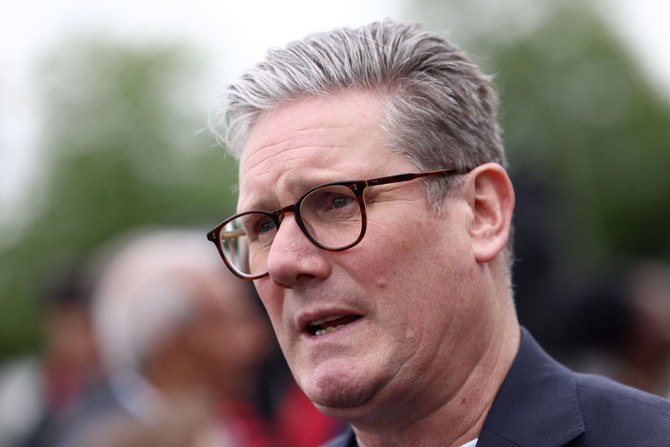
- Muslim Vote group calls for ‘real action’ to regain trust
- Support for Labour in recent local elections fell in areas with high Muslim populations
LONDON: Pro-Palestinian activists have presented a list of 18 demands to the leader of Britain’s opposition Labour Party and said they will not vote for the party at the next general election if he does not fulfill them.
The Muslim Vote, a campaign to get Muslim voters to back pro-Palestine candidates, has called for Sir Keir Starmer to promise to cut military ties with Israel, implement a travel ban on Israeli politicians involved in the war in Gaza and impose sanctions on companies operating in occupied territories.
The group told Starmer he must commit to “real action” and deliver on its requests if he was “serious” about his pledge to rebuild trust with those angered by his stance on the conflict in Gaza, The Telegraph reported.
Supporters would vote for the Green Party or Liberal Democrats if he could not commit to their demands, it said.
Labour’s campaign chief Pat McFadden acknowledged that Starmer’s approach to the conflict had cost the party votes at last week’s local elections. Support for Labour dropped dramatically in areas with a high Muslim populations, including Oldham in Greater Manchester, where the party lost overall control of the council in a shock defeat.
After the result, Starmer said he was determined to regain the trust of those who abandoned Labour as a result of his stance on the Gaza war but did not make any concrete pledges on the matter.
The Muslim Vote challenged Starmer with committing to the 18 demands and implementing them should he become the next prime minister.
They include removing the definition of extremism introduced by Secretary of State for Leveling Up, Housing and Communities Michael Gove and issuing guidance that allows Muslims to pray at school.


